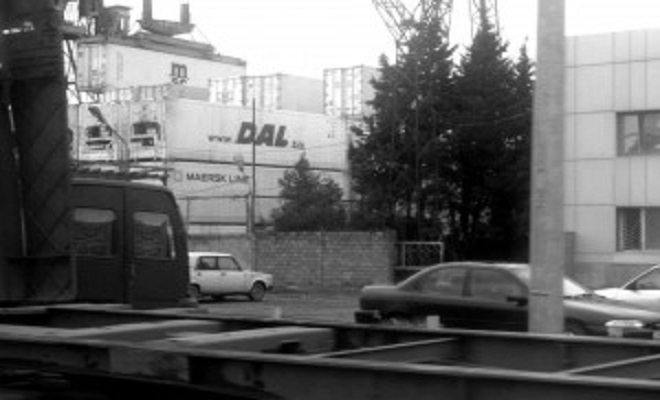 NEO.org
NEO.org
Politics
Red Herrings Muddy the Waters in Georgia’s Largest Port
by , NEO.org:
The newsworthy events in the Republic of Georgia are the ones which are not in the news. The major industrial dispute in Georgia’s largest port, Poti, which has created a bottleneck of 1,500 backed-up containers, is only being superficially reported in the news, or not at all. Having personally contracted all the main Georgian TV stations and print media, it is has become clear why this story is getting little if any attention in either Georgia or the wider world.
One reason is that it is too difficult for the Georgian government to openly admit that a strategic facility may still be under the effective control of remnants of the former government. It is more than likely that some select individuals who are wanted for various crimes, and are technically on the run, are still manipulating the situation in Poti in spite of this. The evidence points to former Defence Minister Davit Kezerashvili pulling the strings through a network of offshore companies, based in Israel and with networks, which only ever seem to have produced drugs for his fellow addicts on the surface.
Another reason is that it is not only government ministers who will have to answer awkward questions about what is going on at the port. All the official bodies have been outflanked by these manipulations, and too many people will have too many questions to answer about how things have got to this stage.
For example, despite the existence of a Georgian Civil Registry no one knows who owns what share of the port. It is listed as being “under reorganisation”, but though it has the same General Manager, an American called Joseph Francis Crowl, its legal status has been changed from Limited Liability Company to Joint Stock Company. Therefore somebody holds stocks in it, and these holdings should therefore be listed.
But neither the listings nor the change of legal status are being reported, presumably because it would be too embarrassing to do so. There is only one other strategic facility in Georgia whose ownership is not listed – Georgian Railway, the next link in the transport chain. This too is “under reorganisation”. Georgians have every right to be concerned about what these facilities are being reorganised into, and to what uses they will be put by their unadmitted new owners.
Wildcat strike
The dispute began on the afternoon on May 5 and is still ongoing. Port operations have come to a screeching halt. Given the parlous state of Georgia’s economy this is the last thing anyone would want to see happen and it should be big news, particularly in a country which covers every second of a public demonstration, to the exclusion of all else, even if it lasts 18 hours a day for days on end.
Approximately 1,000 non-salaried employees are involved in the strike. They are demanding a 14 percent across-the-board salary increase, a reasonable demand considering the rampant inflation and the decline in the buying power of the Georgian GEL. This has fallen nearly 35 percent in a period of four months, notwithstanding inflation of approximately 10 percent per month, thanks in part to American and European sanctions bringing about a reduction in remittances to Georgia from Russia and other countries.
However this strike is not being recognised as legitimate by either the port authorities or the government. This is because the labour union, or “employees”, did not provide a list of the employees’ involved and prior notification of the strike, as they are obliged to do under Georgian legislation. More surprisingly is that the current government refuses to fulfill its contractual mandate, turning a blind eye. It was supposed to act as mediator in the matter but decided to leave it to the sides to sort out the problem. Apparently there is some method in this madness.
The strikers have had ample time to correct this oversight, by giving a list of employees and notice of a coming strike after May 5th, which would make the strike legal from the date specified in that notice. But they have failed to do so, despite knowing what is required and despite the fact striking illegally gives them no rights and damages their employment and retention prospects.
So is this a genuine labour dispute? It smacks of external forces taking advantage of a genuine grievance to pursue aims of their own, which the workers involve may not share or even be aware of. The former government has made no secret of its desire to try and undermine Georgia from within, and the damp squib of an attempted palace coup ago, with the failed support of the US State Department has steeled its resolve to disrupt the state by any means possible. It is not likely that any government would admit that its predecessor has now gained the means to starve the country into submission.
Too many ins and outs
 Poti Port isn’t Georgia’s main transit point simply because of its location. It was made that way during the former Mikheil Saakasvhili government, who insisted on its development and made sure it was owned by the right people. Unfortunately, those “right people” were those who would ensure it became the regional transit hub for illicit weapons shipments to various hotspots around the world, at the behest of US intelligence agencies.
Poti Port isn’t Georgia’s main transit point simply because of its location. It was made that way during the former Mikheil Saakasvhili government, who insisted on its development and made sure it was owned by the right people. Unfortunately, those “right people” were those who would ensure it became the regional transit hub for illicit weapons shipments to various hotspots around the world, at the behest of US intelligence agencies.
The shady history of the port is well known to members of the security agencies and foreign missions. The Georgian authorities have been provided with secret tapes and transcripts of negotiations concerning these shipments, some of which have even been published on Youtube.
Of course, if such things are being done in a port with many owners each one has to be independently bought off and you never know who will break ranks and spill the beans. Therefore in 2008 100% of the port’s shares were transferred to the Ras Al Khaima Investment Authority (RAKIA), whose takeover was heralded as marking a new beginning for the port, though it was doing well enough to begin with.
RAKIA is the investment arm of the United Arab Emirates, and made a series of extraordinary investments in Georgia around this time. For example, when Western developers were pulling out of hotel building projects due to the political situation RAKIA decided to put yet another overpriced five-star hotel in Tbilisi, stating that “when you have a quality product there is no risk”, a sidelong swipe at the developers who had cut their losses before the Saakashvili government could claim its usual percentage.
RAKIA also developed a sudden interest in exporting Georgian sheep, which were not previously held in any regard outside Georgia, unlike some other Georgian livestock and products. The diamonds found in the stomachs of these exported sheep might have given a clue to why they were so valued. When the new government took over RAKIA suddenly lost interest in Georgia, feeling that the qualities it had previously seen in the country were no longer there, again unlikely to have been a purely business decision.
RAKIA divested itself of its interest in Poti port, at least formally. Now a hotchpotch of vested interests are vying for control of it. Those in the best position to exercise control are those most tightly connected to the illegal activities which have been taking placed there for so long, as they need a network around them to protect them, unlike those who trade legally. The illegal activities were undertaken by previous Georgian government members. If anyone else controlled the port, we would know.
Rosneft is getting the blame
Another reason to think the Poti “strike” is a Saakashvili-inspired attempt to destroy the country from within is the rhetoric being used by the “strikers”. At the end of 2014 Russian energy giant Rosneft announced that it had reached an agreement with Petrocas Energy Limited [owned by Georgian businessman David Iakobashvili] to purchase that company’s 49% stake in Poti Oil Terminal. It stated it was launching a joint venture with the company for its oil shipment, storage, retail and logistics activities in South Caucasus.
This 49% stakeholding is not confirmed by actual registry documents, and for a company that size it would be if it were true. In fact, a Georgian businessman has disputed the agreement with Petrocas by claiming that the Petrocas share was illegally confiscated from him in the first place, and this is now being considered by the courts.
But on the basis of this allegation we are being told that “this deal gives the Russian giant a chance to waylay energy resources going to the EU market”. Technically that is true, but the same could equally have been said of RAKIA, which has its own oil distribution network to protect. The clear implication is that the previous Georgian government, which presents the current one as a bunch of Russian stooges, is trying to say that the economy is being handed over to Russia.
This is nothing to do with the ostensible reason for this labour dispute, but that doesn’t matter when your goals are different. The evidence suggests that the previous effective owners of the port are actually doing everything they can to prevent Rosneft taking this 49%, but using the threat of it to blame Russia for everything they themselves are doing.
Anyone for red herring served cold?
Instructions have been given to public media outlets not to delve into this story, and I know that these same instructions have been given to journalists who have reputations for being thorough and who report all sides of an issue in a timely fashion. But what they are not supposed to report is information which is already largely in the public domain.
For example, Transparency International has reported Davit Kezerashvili’s acquisition of holdings in several energy companies since 2011, usually in the name of others given his toxic reputation in Georgia. Kezerashvili is currently facing a wide range of corruption charges, not only deriving from his tenure at Defence, a portfolio notorious for being a robber’s paradise.
He is alleged to have accepted USD 12 million in bribes over several years to cover the smuggling of alcohol from Ukraine to Georgia, and to have done this while serving in public office. In February he was also sentenced to pre-trial detention in absentia for allegedly coercing Joseph Kakhiashvili into giving up his shares in Imedi TV in 2008 and he is suspected by some insiders to have been involved with the death of former tycoon Badri Patikishvili. He will also be questioned in connection with war crimes in 2008 should he ever return to Georgia.
Several well-known carrier lines operate out of Poti Port, including MAERSK, CMA-CGM, MSC and ZIM Line. The various terminals there are run by a range of private companies under a patchwork of lease agreements. In view of the growing cargo traffic between European and Asian countries Poti Port has the potential to increase its cargo-handling capacity and attract and handle up to 25 million tonnes of cargo per annum, so Georgian officials claim.
If this is true, will there be any need for the illegal arms and drugs shipments the port has become notorious for? If Georgia doesn’t need to make its ports available for such activities, won’t those who undertake them, having been thrown out of power, be thrown out of their incomes and influence too, and one day have to answer for their crimes?
What is happening in Poti is not a strike but an attempt by criminal networks to ruin Georgia in someone else’s name. Prosperity and legality are the worst enemies of anyone who takes that road. But the government and media are not rallying the country to withstand this subversion because they know the criminals hold all the cards, at least for now.












